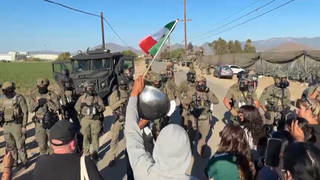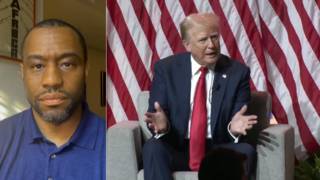
Topics
Guests
- Cecilia Peckdirector of Brave Miss World. Her other films include the Academy Award short-listed Shut Up & Sing and A Conversation with Gregory Peck, about her legendary father.
We speak with filmmaker Cecilia Peck about her father Gregory Peck’s legacy of work that raises important social issues, including his films To Kill a Mockingbird and The Trial of the Catonsville Nine, which landed him on Nixon’s enemies list. “He just had so much decency and integrity that he managed to transcend politics, and people loved him in his films, no matter what their political beliefs were,” says Peck, whose own work is inspired by her father. “I’ve always hoped that I could do that, too.”
Watch the full interview with Cecilia Peck about her new film, Brave Miss World. Her other films include the Academy Award short-listed Shut Up & Sing and A Conversation with Gregory Peck, about her legendary father.
AMY GOODMAN: I’d like to talk about your father, Gregory Peck, and his influence on you, the decisions you have made, his remarkable life’s work, his starring role as Atticus Finch in To Kill a Mockingbird, for which he won the Oscar, and what that film meant in your life.
CECILIA PECK: I’ve always been so interested in how my dad managed to be such a big movie star but also take on controversial issues, like racism in To Kill a Mockingbird and anti-Semitism in Gentleman’s Agreement. And I think that he just had so much decency and integrity that he managed to transcend politics, and people loved him in his films, no matter what their political beliefs were. So, I’ve always hoped that I could do that, too, even in a small measure. But growing up as his daughter, I think I, you know, come from a legacy of the importance of doing work that has meaning and that raises important social issues.
AMY GOODMAN: For people who aren’t familiar, especially young people, with To Kill a Mockingbird, which everyone should see, tell us that story and his role in it.
CECILIA PECK: He plays a lawyer in the South in the 1930s who is asked by the local sheriff to defend a black man accused of assaulting a white woman. And Atticus is a single dad to his two young children, and he realizes that it will draw a lot of attention to him and his family to take on this controversial case in that small town. And there’s a moment in the film when he considers the request, and he says, “I’ll do it.” And you watch their lives transform by the anger of the townspeople for a white lawyer daring to defend a black man. And I think that had my dad been that lawyer in that town, he would have done the same thing.
AMY GOODMAN: The book on which the film is based is by Harper Lee, and you named your son Harper?
CECILIA PECK: I did. I was a very tiny little girl on the set of To Kill a Mockingbird, and I’ve known Harper my whole life and named my firstborn after her. And he—my son was born in New York City, and Harper used to come and read to him, read him bedtime stories. And she’s been and always will be a lifelong part of our family.
AMY GOODMAN: Your father was a famous film star in the 1940s, in the 1950s and the ’60s, so this is during the McCarthy era. There was the blacklist. Talk about how he took that on.
CECILIA PECK: My father wasn’t at the center of the blacklist, but he did end up on Nixon’s enemies list. He made a film called The Trial of the Catonsville Nine about his protest against the war in Vietnam. He did not believe in the U.S. invasion of Vietnam and made a film about it, about the Berrigan brothers burning draft cards in that era. And for that, he ended up on Nixon’s enemies list.
AMY GOODMAN: And what did he say about that?
CECILIA PECK: Well, I remember my grandmother saying, “Gregory, you’re an enemy of the president?” And he said, “It’s alright, Ma. It’s—it’ll be OK.” But I think it may have affected his career. I know that was what Nixon wanted to do, is ruin the lives of the people who opposed his policies. But again, my dad was able to overcome and transcend that. But I—you know, it took a lot of courage to do what he did. And even when he made To Kill a Mockingbird, I think he was asked, “Why would you want to do this story? You’re such a big movie star; you don’t have to take on these kinds of issues.” But that’s just who he was.
AMY GOODMAN: And talk about the film you made about him with Barbara Kopple.
CECILIA PECK: Well, when my dad was in his eighties, he was doing a stage show around the country, an evening of storytelling and showing film clips about his life and career. And Barbara and I had gone to see one of the shows. And he was so charming and so funny, and the audience was full of young people all relating to him, and a lot of people had named their sons Atticus or Gregory or become lawyers because of him. And Barbara and I looked at each other and said, “We’ve got to do a film.” So we got on the phone that night and made a couple calls to see if we could raise money, and ended up following him for a year as he did this show. And it turned out to be a very personal film about his life. And my mother is in it, and his friends and his great film clips. It’s called A Conversation with Gregory Peck.
AMY GOODMAN: And finally, what it was like for you to go from being behind the scenes, like a kid on the set of To Kill a Mockingbird, to being an actress yourself, for example, in Wall Street, to then going behind the camera?
CECILIA PECK: I also did a film in Israel, one of my first films, called Torn Apart, where I played a Palestinian woman in love with an Israeli soldier. So, I think, from that time, I had this incredibly powerful memory of Israel, and it’s so interesting that this film is taking me back there. But I think I—you know, my dad had felt like maybe I had in me what it took to be an actress, and I got to do some work that I was very proud of. But I had always wanted to make films behind the camera. So, I was able to go and work with Barbara Kopple here in New York at Cabin Creek and learn filmmaking, and she let me believe that I could have a voice as a filmmaker. And, you know, I think I found what I always really wanted to do.












Media Options